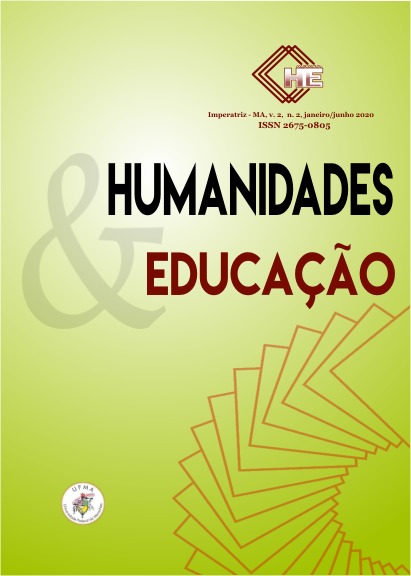“HABEMUS” IDEOLOGIA: breves considerações sobre ideologia e educação na experiência do PIBID
Keywords:
Educação. Crítica. Ideologia.Abstract
O hodierno cenário sociopolítico brasileiro testemunha em seu percurso histórico a sanha de um permanente discurso antagonista a ideologia. Há uma sensação, por assim dizer, de que todo e qualquer mecanismo ideológico deve ser execrado do esteio social. Sob a perspectiva filosófico-social, a educação é compreendida como uma determinada forma de vida orientada à práxis (entendida preliminarmente como efetivação das condições mínimas de existência social) sendo, portanto, concebida enquanto um mecanismo ideológico. Nesse sentido, sob o ponto de vista da pesquisa crítica e filosófica, cabe a pergunta se é possível pensar e efetivar uma determinada forma de vida sem o aparato ideológico. Nesta pesquisa mediada pela nossa experiência no PIBID, e na contrapartida do discurso “negativista” sobre a ideologia, buscamos explicitar que a esfera educacional não está imune ao aparato ideológico; pelo contrário, a educação não está apenas enredada em uma determinada forma compreensiva ideológica; mas, sobretudo, essa mesma compreensão pode se constituir como uma mediação para a práxis.
Palavras-chave: Educação. Crítica. Ideologia.
“HABEMUS” IDEOLOGY: brief considerations on ideology and education in the experience of PIBID
Abstract
The current situation Brazilian socio-political scenario witness in its historical background a grudge discourse against the ideology. There is a overall perception that all sorts of ideological mechanisms must be cast out from the social mainstay. From the point of view of a philosophical-social approach, the education is understood as a certain form of life oriented to praxis (understood primarily as the realization of the minimum conditions of social existence) and is therefore conceived as an ideological mechanism. In this sense, take into account the criticalphilosophical research, the question arises whether it is possible to think and carry out a certain form of life without the ideological approach. In this research, we aim exhibit that the educational sphere isn't immune to the ideological issues; in contrast, the education isn't just entangled in a certain comprehensive ideological form; but, above all, this same understanding can constitute a medium to the praxis.
Keywords: Education. Critique. Ideology.
Downloads
References
BEW, John. Realpolitik: A History. Oxford: Oxford Press, 2016.
BRUNKHORST, Hauke. Kritik und Kritische Teorie. Baden Baden: Nomos, 2014.
DEMIROVIC, Alex (Org.). Modelle kritischer Gesellschaftstheorie: Traditionen und Perspektiven der Kritischen Theorie. Stuttgart: Springer Verlag, 2003.
DETEL, Wolfgang. Philosophie des Sozialen. Stuttgart: Reclam, 2013. 191p. (Grundkurs Philosophie Band 5).
FISCHBACH, Franck. Die Umtriebe des “Sozialen”. In: _____. Manifest für eine Sozialphilosophie. Bielefeld: Transcript Verlag, 2016. p. 81-92.
FORST, Rainer et. al. Sozialphilosophie und Kritik. Frankfurt am Main: Suhrkamp Verlag, 2009.
FORST, Rainer. Normativität und Macht: Zur Analyse sozialer Rechtfertigungsordnungen. Berlin: Suhrkamp Verlag, 2015.
GATTI, B. A. Educação, escola e formação de professores: políticas e impasses. Educar em Revista. Curitiba, n. 50, p. 51-67, 2013.
BEW, John. Realpolitik: A History. Oxford: Oxford Press, 2016.
BRUNKHORST, Hauke. Kritik und Kritische Teorie. Baden Baden: Nomos, 2014.
DEMIROVIC, Alex (Org.). Modelle kritischer Gesellschaftstheorie: Traditionen und Perspektiven der Kritischen Theorie. Stuttgart: Springer Verlag, 2003.
DETEL, Wolfgang. Philosophie des Sozialen. Stuttgart: Reclam, 2013. 191p. (Grundkurs Philosophie Band 5).
FISCHBACH, Franck. Die Umtriebe des “Sozialen”. In: _____. Manifest für eine Sozialphilosophie. Bielefeld: Transcript Verlag, 2016. p. 81-92.
FORST, Rainer et. al. Sozialphilosophie und Kritik. Frankfurt am Main: Suhrkamp Verlag, 2009.
FORST, Rainer. Normativität und Macht: Zur Analyse sozialer Rechtfertigungsordnungen. Berlin: Suhrkamp Verlag, 2015.
GATTI, B. A. Educação, escola e formação de professores: políticas e impasses. Educar em Revista. Curitiba, n. 50, p. 51-67, 2013.
PINZANI, Alessandro, TONETTO, Milene C. (Org.). Critical Theory and Social Justice. Florianópolis: Nefi-ponline, 2012.
SCHNEIDEREIT, Nele. Die Dialektik von Gemeinschaft und Gesellschaft: Grundbegriffe einer kritischen Sozialphilosophie. Berlin: Akademie Verlag, 2010.
STAHL, Titus. Immanente Kritik: Elemente einer Theorie sozialer Praktiken. Frankfurt am Main: Campus Verlag, 2013.
TURKLE, Sherry. Alone Together: Why we expect more from Technology and less from each other. Philadelphia: Basic Books, 2011.
WESCHE, Tilo. Reflexion, Therapie, Darstellung: Formen der Kritik. In: JAEGGI, Rahel, WESCHE, Tilo (Org.). Was ist Kritik? 3. ed. Frankfurt am Main: Suhrkamp, 2013. p. 193-220.
ZIZEK, Slavoj. Felicidade e Tortura no mundo atonal. In:_____. Em defesa das causas perdidas. Tradução Maria Beatriz de Medina. São Paulo: Boitempo, 2011. p. 29-69.










